#Cuba covid-19
Photo
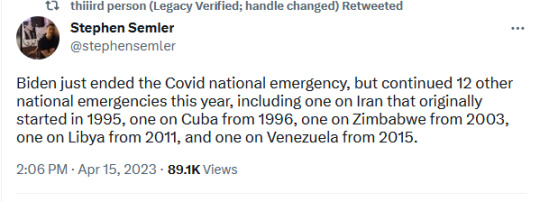
You can read those and the others here:
https://federalregister.gov/presidential-documents/other-presidential-documents/joe-biden/2023
How many of them were you even aware of?
28 notes
·
View notes
Text
Welp, I followed up with cardiology this week. I was hoping that my 6 month post COVID myocarditis cMR would clear me to go back to exertional activities. Instead, I was given another 2 months of activity restriction, a follow up echo, and 2 new prescriptions to go along with my EF of 45% and “mildly dilated ventricles” so ya girl is basically getting treated for heart failure now? At least I have a legit reason that my exercise tolerance is shit.
#p sure at this point I'm not going to have to take a pt test this year#activity restriction since december#fuck covid#i take more meds than more of my patients#myocarditis#i take more meds than my 94 year old grandmother#seriously wth#covid 19#covid complications#heart failure with minimally reduced ejection fraction#can't believe that's a real diagnosis#and the detailer still thinks that I'm going to recover enough to get sent to cuba in january#thats an itty bitty teeny tiny hospital with no specialty care I'm sure the Navy really wants to send me there#medevacs are hella expensive
7 notes
·
View notes
Text
as you see the inhuman list of items banned from entry into gaza, you should be keenly aware the partner in israel's murder-suicide pact, the united states, has had an embargo on cuba (effectively doing the same to iran with sanctions too btw) for decades that includes medical supplies.
none of this was lifted for covid 19. both our cruel, barbaric countries will deny the absolute bare necessities for our genocidal economic projects
9K notes
·
View notes
Text
Avances Tecnológicos en la vida Postpandemia: Perspectivas de Cuba y Argentina-Matthew
Después de gran parte de la pandemia, latinoamerica había sufrido muchos malos efectos. Dos ejemplos de países que tuvieron experiencias notables son Cuba y Argentina. Desde el comienzo de 2020, Argentina ha tenido el segundo mayor número de casos de COVID-19 en todo el latinoamerica. Por otro lado, en Cuba, la inversión en el cuidado de salud causó una respuesta positiva y efectiva. Los dos países sintieron la presencia de COVID-19 pero tuvieron experiencias muy diferentes y usaron maneras únicas para combatirlo.
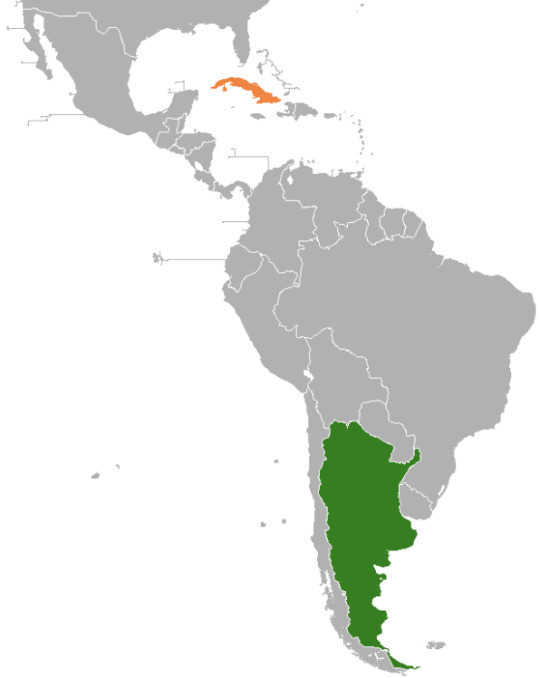
Cien días antes de la pandemia, un gobierno nuevo tomó el control de Argentina. Había mucho caos económico y debilidad social cuando la pandemia empezó. La historia de la ola primera de COVID-19 en Argentina fue muy triste y desgraciada porque el gobierno nuevo no tuvo las herramientas para ayudar a la gente. Más de diez millones personas tuvieron la enfermedad cuando la ola primera de 2020 terminó. Sin embargo, fue un cuento diferente cuando la ola segunda empezó. El gobierno estuvo listo y usó mucho dinero para traer unas vacunas a Argentina para ayudar a las personas enfermas. También, cuando la vida de cuarentena fue normal, Argentina usó la telemedicina para mantener las personas enfermas en sus casas. Con la tecnología nueva, Argentina combatió la pandemia y mitigó los efectos de COVID-19. Hoy, después de la pandemia, Argentina y otros países del mundo usan las mismas maneras para tratar y prevenir algunas enfermedades como la gripe. La historia de Argentina muestra el poder de la tecnología cuando luchamos algunos fenemenos naturales. Aunque al principio la situación fue difícil para Argentina durante la pandemia, el país se preparó mejor para la segunda ola, entonces la vida es muy fácil después de la pandemia. Utilizando nuevas herramientas como la telemedicina y comprando más vacunas, logró combatir y reducir los efectos del COVID-19. Sus estrategias para luchar las enfermedades todavía son efectivos y probablemente será usado hasta la introducción una enfermedad nueva que es muy peligrosa.


Por otro lado, antes de la pandemia, Cuba se había preparado en caso de algunos fenemenos naturales. Cuando la pandemia empezó Cuba cerró sus fronteras muy rápido y abrió unos centros para las pruebas de COVID-19 y para tratar la gente enferma. También Cuba fue uno de los primeros países para tener unas aplicaciones para el rastreo de los contactos. Con esta tecnología el gobierno y los hospitales en Cuba podrían rastrear alguien que podría tener la enfermedad. Los científicos en Cuba también usaron unos modelos en linea que tuvieron todos los datos y hechos sobre la pandemia en Cuba. Usaron los modelos para predecir dónde la enfermedad será popular y cuál maneras serán la mejor para combatir la pandemia. El sistema del cuidado de salud en Cuba usó mucha tecnología avanzado y salvó muchas vidas. El éxito de los esfuerzos valientes de Cuba causó muchos países también para usar métodos similares cuando tienen problemas con unas enfermedades. Los esfuerzos exitosos de Cuba son unos ejemplos para otros países que necesitan parar la propagación de una enfermedad peligrosa. La manera en que Cuba mitigó los efectos de la pandemia inspira otras regiones para tener las mismas acciones cuando tienen que combatir otras enfermedades y fenómenos naturales. Cuba usó tecnología para cerrar las fronteras rápidamente, realizar pruebas de COVID-19 y rastrear contactos, salvando vidas en el proceso.

La tecnología cambió cómo Cuba y Argentina enfrentaron la pandemia. Argentina usó telemedicina y vacunas, mientras que Cuba cerró rápido y usó apps para rastrear. Estos países mostraban cómo la tecnología será clave en la vida postpandemia con otros fenemenos naturales. En América Latina, quieren reconstruir con tecnología y cuidando el medio ambiente. Si te gusta escuchar sobre las conexiones entre la vida estadounidense y la vida latinoamericana, te recomiendo el blog de la cuenta @joshandlukas que se llama "Latinoamericanos en el Béisbol". También si quieres entender mas de cómo América Latina tuvo un impacto global, te recomiendo el blog de la cuenta @jlyjdque que se llama "Una Historia Musical Del Siglo XX Latinoameriano". Pronto, en nuestro blog, hablaremos más sobre cómo esto afecta América Latina. ¡No te lo pierdas!
Las Fuentes:
https://www.statista.com/statistics/1101643/latin-america-caribbean-coronavirus-cases/
https://www.thelancet.com/journals/laninf/article/PIIS1473-3099(21)00159-6/fulltext#:~:text=The%20island%27s%20successful%20response%20to,patient%20ratios%20in%20the%20world.
https://www.ilo.org/wcmsp5/groups/public/---americas/---ro-lima/---ilo-buenos_aires/documents/publication/wcms_765144.pdf
https://www.fda.gov/vaccines-blood-biologics/vaccines
https://maidenlanemedical.com/blog/blog-exciting-telemedicine-service-makes-health-care-even-more-convenient/
https://www.news-medical.net/news/20230709/The-vital-role-of-smartphone-apps-during-the-COVID-19-pandemic.aspx
Matthew
0 notes
Text
OMS declara fin de la emergencia global por Covid-19
He tomado esa decisión, pero con precaución, y si la situación epidemiológica mundial cambia no dudaré en volver a declarar la emergencia, advirtió el director general de la OMS, Tedros Adhanom.
La Organización Mundial de la Salud (OMS) anunció hoy el fin de la emergencia sanitaria global por el coronavirus SARS-CoV-2, causante de la Covid-19.
«Ayer, el Comité de Emergencia se reunió por decimoquinta vez y me recomendó que declarara el fin de la emergencia de salud pública de importancia internacional. He aceptado ese consejo», expresó el director general de la OMS, Tedros Adhanom.
He…

View On WordPress
0 notes
Text
Cuba: cinco victorias estratégicas
Cuba: cinco victorias estratégicas
En los últimos dos años, la Isla mantuvo una resistencia creativa que no solo frenó la ofensiva enemiga, sino que le permitió romper el asedio por cinco frentes estratégicos, lo que pone al país en mejores condiciones para reforzar el paso en la construcción de un socialismo próspero y sustentable.
La Covid
La pandemia de la covid-19 constituyó un serio problema de salud pública para Cuba.…

View On WordPress
0 notes
Text
Nueva publicación. Cómo la OPS ha convertido a Cuba en un "modelo" para el mundo
Nueva publicación. Cómo la OPS ha convertido a Cuba en un “modelo” para el mundo
Photo: Cuban farmer. AdobeStock.
Archivo Cuba ha publicado un nuevo informe investigativo titulado “La Organización Panamericana de la Salud y Cuba: una colaboración controversial.” Con casi 150 páginas y más de 600 fuentes bibliográficas, está atestado de datos y testimonios que constituyen material de referencia académica y llenan un gran vacío. Puede descargarse en el portal de Archivo…
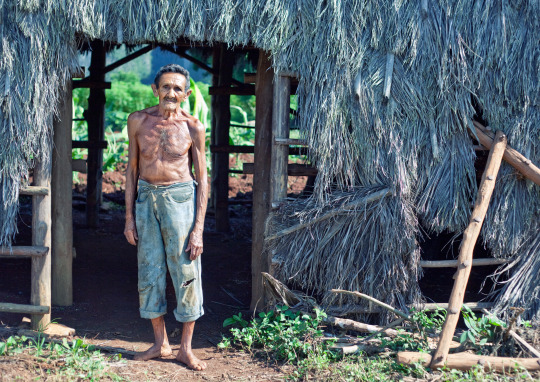
View On WordPress
0 notes
Text
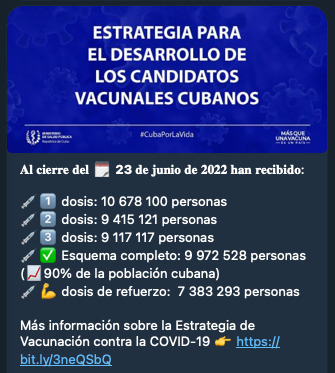
C'est beaucoup, beaucoup de Cubanos vaccinés pour un virus qui est fatal pour moins de 1% de la population ...
0 notes
Text
Cuba culpa a EEUU de la falta de insumos para los niños durante la pandemia habiendo rechazado la COVAX
Cuba culpa a EEUU de la falta de insumos para los niños durante la pandemia habiendo rechazado la COVAX
“La acusación de Cuba a EEUU esta más enfocada en la no invitación a la IX Cumbre de las Américas, a la cual no fue invitada, que a problemas durante la pandemia de COVID-19”
Luego de que el gobierno de Cuba rechazara la iniciativa de la OMS (COVAX) durante la crisis sanitaria producto de la pandemia de COVID-19, ahora sale a la carga en contra de EEUU a quien responsabiliza de la falta de…

View On WordPress
#COVID-19#cuba#EEUU#Estados Unidos#Medicos Cubanos#mentiras del gobierno cubano#pandemia de la covid-19#régimen cubano
0 notes
Text
US quietly expands asylum limits while preparing to end them
US quietly expands asylum limits while preparing to end them
SAN DIEGO (AP) — The Biden administration has begun expelling Cubans and Nicaraguans to Mexico under pandemic-related powers to deny migrants a chance to seek asylum, expanding use of the rule even as it publicly says it has been trying to unwind it, officials said Wednesday.
The U.S. struck an agreement with Mexico to expel up to 100 Cubans and 20 Nicaraguans a day from three locations: San…
View On WordPress
0 notes
Video
Cuba and the COVID-19 vaccine
#tiktok#cuba#COVID-19#vaccine#vaccine apartheid#vaccines#health news#medical news#trade embargo#iran#Argentina#health internationalism#health insurance#Health Care#Healthcare#health#venezuela#nicaragua#vietnam
23 notes
·
View notes
Text
Hannigram Fic Recs!
These are just a select few of my personal favorites. I'm sorry if these are too long but I mostly only read long fics
Shark Tank by xzombiexkittenx (71k) (Explicit) - Will and Hannibal meet in prison. Hannibal is still the Ripper, Will is still a profiler who had encephalitis. Only now they're cell mates (SO GOOD and i love love the ending of this one)
Five Times Hannibal Visits Will and One Time He's Already Home (or: Coffee Cake) by bones_2_be (82k) (Explicit) - When Will tells Hannibal to leave at the end of Digestivo, he goes. And then, a few years later, he shows back up. They have long conversations, drink a lot of wine, at the end of it all they find something that works.
In Sickness and in Health by BonesAndScales (76k)(Mature) - Everyone knows that Will and Hannibal are married. Not everyone knows that they are married to each other. (SO CUTE)
Letters to You by Wr4tttttthh (17k)(Explicit) - Will and Hannibal want to learn to love. It isn't easy, it never was. (Post-Fall where they both keep a journal and they write letters to each other. There's some angst but its so so so sweet such a good read)
Time Waits for No One by Shotgun_sinner (104k)(Explicit) - After Will turns Hannibal away in Digestivo, he does not surrender to Jack. Instead, he heads to Cuba with Chiyoh, where he recovers from emotional and physical wounds. Hannibal was resolved to let Will go, and he does. Until he reads a Wedding Engagement announcement, that is. (THIS ONE IS SO GOOOD)
On Hiatus by Observe_or_Participate (197k)(Explicit) - AU where Abigail and Hannibal met in similar circumstances to those narrated in S1, only without Will being in the picture. They bonded. 4 years later, it's early summer 2021. Hannibal and Abigail are living in Tuscany as father and daughter, where they run a high-end bed and breakfast in a remote location on the hills... amongst other things. FBI profiler Will Graham, on leave from work after the restrictions caused by the Covid-19 pandemic worsened his already iffy mental health, arrives on the premises, for reasons he is not fully ready to admit to himself. An incendiary attraction between our two boys is inevitable, but how honest can they really be with each other? (THIS IS SO UNDERRATED OMG)
between here and there by deadratz (78k)(Explicit) - Will's name is the last word Hannibal spoke in his presence. That was two months ago, directly after the fall, and Hannibal has not said a single word since. Now Will has to navigate through their lives together without Hannibal's voice to guide him. (PLEASE READ THIS ONE IT IS SO BEAUTIFUL)
Falling Away with You by Shotgun_sinner (191k)(Explicit) - Will Graham is a private detective with a fiancée who doesn't understand him, his empathy disorder, or his obsession with catching the Chesapeake Ripper. His night terrors force him into an ultimatum; couple's therapy, or their relationship is done. Will meets his new therapist, Hannibal Lecter, and his entire world is turned upside down. (this is one of the first hannigram fics i ever read and i still come back to it often it is so good)
Dianthus Barbatus by Cynthia_Cross (84k)(Explicit) - Set 10 years before the start of the show, Will and Hannibal meet in the dead of night while dumping the bodies of their respective victims in the same place. (THIS IS SOME GOOD SHIT HERE)
With a Crown of Stars by romanticallyinept (33k)(Explicit) - When the call connects, Will says, “I know what kind of crazy I am, but I’m not this kind of crazy.” “Will?” Dr. Lecter says. “Yes, hi, sorry,” Will says. “It’s me. There’s a baby on my porch.” (A cute kidfic to end with. I was grinning the whole time)
I hope you guys enjoy these. If you read any of them(or have read them before) tell me your thoughts. I feel like i don't have anyone to scream with about fics
@imthebisexual @mildlyinterestedcreature
#hannigram#hannibal#nbc hannibal#will graham#hannibal lecter#hannigram fanfiction#hannigram fic#murder husbands
138 notes
·
View notes
Text
Klance Fic Rec
been so busy guys but trying to catch up i promise!!

I dreamed you were a cosmonaut (of the space between our chairs) by iybms
T | 11K | 1/1 | getting together, flirting, kissing, near death experiences, mutual pining, canon compliant
"You know, you can be a pretty hard guy to find," Lance says, and his steps end at Keith's side, overlooking Orla'an canyon.
"Funny you always say that," Keith remarks, "since you find me, regardless. And," he finally glances at Lance, "…always wearing something weird."
---
Lance comes to Keith when he needs someone to pry him open.
Nameless by AveryScribbles
E | 97.8K | 22/22 | AU college, vampires, soulmates, major character injury, angst with a happy ending, blood drinking, slowburn
Lance McClain was not pale. He enjoyed the sun as much as any other, and though he was often run down or fatigued, this was due to his amounting college work, not his need to sleep upside down. He was everything a vampire wasn't. Oh, except for his constant cravings for blood, and the name in cursive imprinted on his wrist.
Since the name had appeared on Lance's thirteenth birthday, he'd been desperately waiting for the day he'd finally meet his soulmate. And then it finally arrives, delivering a boy that causes everything Lance had fantasized to come crashing down around him. Not only is his mate a human, but he's the kind of human that despises vampires. A hunter named Keith.
But matters of the heart aren't the only thing standing in Lance's way, for a much greater enemy is on the horizon, posing a threat not only to Lance and his family, but to Keith, too. The nameless are coming for them, and soon.
just come to me once by laallomri (absolute fav fic ever)
T | 94.5K | 3/3 | fluff, angst, pining, canon typical violence, post season 6
Lance’s smile widens. He leans forward, and the prickling in Keith’s chest gives way to butterflies, fluttering wildly in his stomach, and oh wow has Lance always had this many freckles, has he always had eyelashes that long, has he—
Lance pokes his cheek, right over the Galra mark. Keith blinks.
“I can’t believe you and your mom have matching face tattoos now,” he says, and it’s so fucking dumb, but it’s exactly the kind of dumb thing Keith has longed to hear, and before he knows what he’s doing he’s surging forward, almost knocking Lance back against Red’s paw, and throwing his arms around him.
In which Keith lives on a space whale, goes on a road trip, and (eventually) gets a boyfriend.
Like the Night Falling by iybms
E | 51.9K | 1/1 | rivals to friends to lovers, slow burn, astrophysics, sexual content
Keith reluctantly takes a lead role in an outreach program that forces him outside his comfort zone of solitary work. It would be a lot easier if he and his partner in the endeavor had anything in common.
Catch Feels, Not Covid-19 by Jenanigans1207
G | 20.2K | 7/7 | quarantine AU, covid 19, falling in love, confessions, artist keith
“Well, there’s really only one option, then.” Lance says as he steps further into the room. At least he looks equally as uncomfortable as Keith feels. At least he seems to know he’s broken their boundaries.
“Really?” Keith grinds out, but his anger is deflating. The stress of the situation is starting to wear on him and he just wants it to be over. “Because as far as I can tell, there are no options.”
“You’ll just have to come home with me.” Lance says and Keith balks. He physically feels the color drain from his face as he whips his head around to meet Lance’s blue eyes. He doesn’t even get the incredulous question off of his tongue before Lance is rushing on to explain. “My family visits Cuba every year at this time and since they closed the borders, they’re stuck there until this is over. So my home is completely empty which means there will be tons of room for you, too! And it’s only a couple of hours away, so we won’t risk getting caught anywhere in the middle. And it’s free.”
-- Or:
The coronavirus shuts down Keith and Lance's college and Keith has no choice but to go into quarantine with Lance.
At the Bottom of the Ramp by iybms
T | 12.2K | 1/1 | aggressive rollerblading, strong language, minor violence, getting together, rivals to friends to lovers
Lance is usually the first person to befriend new rollerbladers at the skatepark; it's a small community, and he's a friendly guy.
But not this time. This new guy looks the epitome of edgy and unapproachable, and he's stealing all of Shiro's attention.
#keith kogane#lance mcclain#klance#klance fic#fanfiction#fan fic rec#fic rec#klance fic rec#voltron#voltron legendary defender
178 notes
·
View notes
Text
It has been around six months since the start of the war between Russia and Ukraine. During this time, the world has keenly witnessed seismic shifting trends across economic, geopolitical and cultural lines. But perhaps the most profound impact the conflict has had (and continues to have) on the world is the acceleration it has inspired towards multipolarity—that is, global power more evenly distributed amongst several advanced economic nations rather than contained within a single hegemonic power, which in this case is the United States. Underpinning much of this acceleration, moreover, is the trend of de-dollarisation.
It should be highlighted from the outset that de-dollarisation has been, observably, a long-term process that emerged over the last two decades. A March paper from the International Monetary Fund (IMF) found that the dollar still plays “an outsized role” in global markets despite the US economy representing a shrinking share of global output over the last two decades and that its dominant role in global trade, international debt and non-bank borrowing still far outstrips the US’ share of trade, bond issuance, and international borrowing and lending.
But the IMF also noted that central banks today are not holding the greenback as reserves in the same quantities as yesteryear. “The dollar’s share of global foreign-exchange reserves fell below 59 percent in the final quarter of last year, extending a two-decade decline, according to the IMF’s Currency Composition of Official Foreign Exchange Reserves data,” the paper stated. “Strikingly, the decline in the dollar’s share has not been accompanied by an increase in the shares of the pound sterling, yen and euro, other long-standing reserve currencies…. Rather, the shift out of dollars has been in two directions: a quarter into the Chinese renminbi, and three quarters into the currencies of smaller countries that have played a more limited role as reserve currencies.”
Why is this the case? Seemingly, a multitude of factors are responsible. For one, it appears the world has reached something of a tipping point this year. With around one-quarter of the global population suffering from the direct impact of US-led economic sanctions, which invariably diminishes their ability to trade and perform other necessary economic and financial activities that are often priced using the dollar, it should perhaps come as no surprise that de-dollarisation has intensified across the world. Indeed, this trend often simply reflects the desperation of some countries to survive, let alone thrive, with brutal sanctions having remained on countries during the COVID-19 pandemic proving devastating in some cases.
“The destructive impact of said measures at the national level, plus their extraterritorial implication, together with the phenomenon of over-compliance and the fear for ‘secondary sanctions’, hinder the ability of national governments in procuring even basic medical equipment and supplies, including coronavirus test kits and medicine,” a joint March 2020 letter from the governments of China, Cuba, Iran, Nicaragua, North Korea, Russia, Syria and Venezuela—all bearers of US-led sanctions—to the Secretary-General of the United Nations, the Office of the United Nations High Commissioner for Human Rights and the Director-General of the World Health Organization (WHO) read. The letter called for an end to sanctions, which “illegal[ly] and blatantly violate international law and the charter of the United Nations”, and that it was a “hard if not impossible deed for those countries who are currently facing the application of unilateral coercive measures” to cope.
Sanctions have also played a critical role in the ongoing conflict in Eastern Europe. Indeed, as the schism has continued to widen this year between the West, dominated by the United States, the European Union (EU) and Japan, versus the Eastern powers of China and Russia, there have been a number of concerted moves by the latter to wean themselves off their reliance on the greenback. For Russia, de-dollarisation began around 2014 after it annexed Crimea, which was executed in response to what it perceived was a US-backed coup d’état in Ukraine. The Western sanctions that followed the annexation drastically reduced Russian entities’ ability to raise capital in Western markets, which forced Moscow to reduce its dollar holdings and dramatically increase its exposure to alternative assets, such as gold.
Since the outbreak of war this year and the imposition of further economic sanctions against Russia in response, Moscow has only further expedited this de-dollarisation process. Having been excluded from the SWIFT (Society for Worldwide Interbank Financial Telecommunication) system, which banks use globally to transfer funds, Russia first hiked its key interest rate to 20 percent to protect the ruble, imposed further capital controls to prevent excessive currency from leaving its shores and insisted that all “unfriendly” countries pay only in rubles for its vast exports of fossil fuels.
More recently, Russia has been busy agreeing on bilateral fuel deals with several countries involving at least partial payment in rubles rather than dollars. For instance, it signed a roadmap for economic cooperation and trade with Turkey worth $100 billion a year, with Ankara agreeing to pay for gas imports in rubles. Turkey also confirmed that five of its commercial banks would use the Russian Mir payment system, helping Russian tourists in Turkey to use their currency.
Domestically, meanwhile, Russia’s largest exchange, Moscow Exchange, announced on August 8 that it would halve the maximum threshold of dollars it can accept as collateral to underwrite transactions from 50 percent to 25 percent. Any sums exceeding this limit would have to be converted into “friendlier” alternatives. And Moscow Exchange has also started trading bonds denominated in the Chinese yuan to attract Asian investors and further diversify away from the greenback. “Debt instruments denominated in the Chinese yuan open up an additional source of forex liquidity for Russian borrowers,” said Gleb Shevelenkov, head of the debt market at Moscow Exchange.
Speaking of the yuan, China’s rapidly growing global economic might may pose the biggest threat to the dollar’s status as the world’s reserve currency. And its recent forays into Middle Eastern markets—Saudi Arabian oil in particular—could ultimately go a long way towards tipping the scales in favour of widespread adoption of the Asian superpower’s currency. Indeed, part of how the US dollar rose to global supremacy in the first place has been down to its role as the de facto currency used in global commodities markets. Commonly known as the “petrodollar”, the requirement for the massive value of global oil sales to be denominated in the dollar has gone a long way towards guaranteeing the credibility of the currency, particularly after the US left the Bretton Woods system of monetary management in 1971, which severed the dollar from its backing of gold bullion.
Since then, the petrodollar has thus been crucial in maintaining global dollar hegemony. “The oil market, and by extension the entire global commodities market, is the insurance policy of the status of the dollar as reserve currency,” economist Gal Luft, co-director of the Washington-based Institute for the Analysis of Global Security and co-author of the book De-Dollarization: The Revolt Against the Dollar and the Rise of a New Financial World Order, explained to the Wall Street Journal. “If that block is taken out of the wall, the wall will begin to collapse.”
Cue the “collapse”? Perhaps not completely or imminently, but relations between the US and Saudi Arabia have visibly soured in recent years at the same time as the world’s largest oil exporter has demonstrated a distinct warming to China. Over one-quarter of Saudi oil exports were snapped up by China in 2020, while state oil behemoth Saudi Aramco also recently concluded a $10-billion deal with Chinese petroleum companies. And with reports suggesting that oil transactions between the two countries could well be priced in yuan in the near future, this would dramatically raise the Chinese currency’s global profile and severely dent the petrodollar’s worldwide dominance.
With China extending billions of dollars of investment funding to Saudi Arabia this year and relations between President Xi Jinping and Crown Prince Mohammed bin Salman on the rise, therefore, things could develop rather quickly in favour of the East. “The dynamics have dramatically changed. The US relationship with the Saudis has changed. China is the world’s biggest crude importer, and they are offering many lucrative incentives to the kingdom,” an unnamed Saudi official told the Wall Street Journal in March. “China has been offering everything you could possibly imagine to the kingdom.” And while some analysts believe a wholesale shift onto yuan pricing is unlikely, others believe that a partial shift would enable payments to Chinese contractors currently involved in mega projects within the kingdom.
Other than the petrodollar, the US has also historically propped up its currency by issuing government debt to other nations, which has helped to finance its budget deficit. During the 2008 global financial crisis, China came to the US’ rescue by purchasing enormous quantities of US Treasury bills. Indeed, by 2010, China held more than $1 trillion in US Treasuries, and between 2008 and 2013, its foreign-exchange reserves—US debt-instruments holdings—expanded by a mammoth $2 trillion.
But in July, it was revealed that China’s holdings of US debt had fallen back under $1 trillion for the first time in 12 years, extending a trend of offloading US Treasuries that began in 2017 as the trade war waged by the US against China intensified. Given the further deterioration in relations between the two economic heavyweights that has transpired this year, it would thus appear that China is now keener than ever to rid itself of its dollar exposure. “They’re unhappy with the way the U.S. keeps using financial sanctions around the world,” David Dollar of the Brookings Institution’s China Center told Marketplace in July. Referring to the decision to kick Russia off SWIFT, Thomas Hogan of the American Institute for Economic Research added that this was “a major wake-up call” for China and other nations not fully aligned with Western political goals. “They realize that the SWIFT system could be used as a political weapon to harm them economically.”
Even developing nations are getting in on the act in clear acts of defiance against the dollar empire. Egypt, for example, has suffered greatly under the weight of borrowing as it seeks to stabilise its economy and prop up the value of the Egyptian pound. Indeed, the country’s sovereign debt has roughly quadrupled in the last 10 years as it has repeatedly sought financial support from US-led development institutions such as the IMF. But the cost of servicing this dollar-denominated debt has seriously dented Egyptians’ living standards amidst a deteriorating global economic landscape.
Cairo’s solution? Issuing yuan-denominated debt to raise funding in the Chinese bond market for the first time, a move announced as a realistic option by the Minister of Finance Mohamed Maait in May 2022. “The growing mountains of debt and high cost of borrowing in USD is forcing Egypt to seek alternative windows for funding to avert a potential sovereign debt crisis and a collapse in EGP’s purchasing power, which could destabilise society and the government,” Magdy Abd Alhadi, an Egyptian economist, told The New Arab news publication. Independent analyst Firas Modad added, “Egypt imports a large amount of goods and services from China, including for the construction of the New Administrative Capital. This requires Egypt to have access to the yuan. It is likely cheaper to borrow in yuan than to borrow in dollars and convert to the yuan.”
What does all this say about the dollar’s credibility in 2022? For some, de-dollarisation can be viewed as an expression of a loss of confidence in the US currency as a safe haven—a status that the dollar has enjoyed for decades—and a preference for seeking safety in alternative assets, such as gold and other currencies.
A survey published in June by the World Gold Council (WGC), for instance, found that 80 percent of the 57 central banks it surveyed expect to expand their gold reserves within the next year, particularly those within emerging markets and developing economies (EMDEs). “More EMDE respondents regard ‘shifts in global economic power’ as a relevant factor in their reserve management decisions, which could indicate growing concerns over the threat of a decoupling between major economies amid ongoing tensions,” the report stated, adding that 42 percent of respondents expect the dollar to decline as a proportion of total reserves in the next five years as they—EMDE central banks in particular—are now less confident in the role of the US dollar as a global reserve currency.
Of course, one might well scoff at the notion of the world being governed by any currency other than the US dollar in the near future. But as this year has shown, global dynamics can shift quickly. As one of Russia’s most revered figures [lol] famously said, “There are decades where nothing happens; and there are weeks where decades happen.” We are now observing such “weeks”. Given the massive power plays undertaken by the US, China, Russia and many other nations, the seemingly unstoppable rise of global multipolarity can only mean the further weakening of the dollar’s supremacy. One wonders whether the US has the wherewithal to successfully pivot away from its prevailing foreign-affairs approach to prevent it.
even demons know
149 notes
·
View notes
Photo

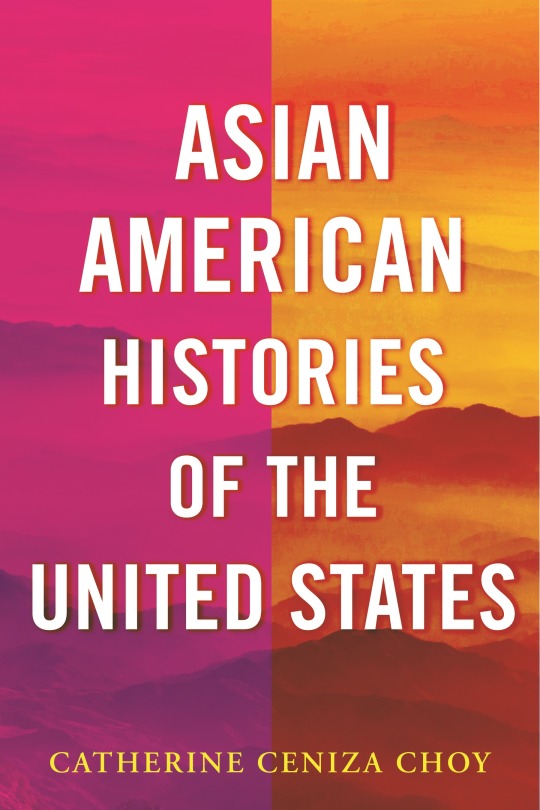
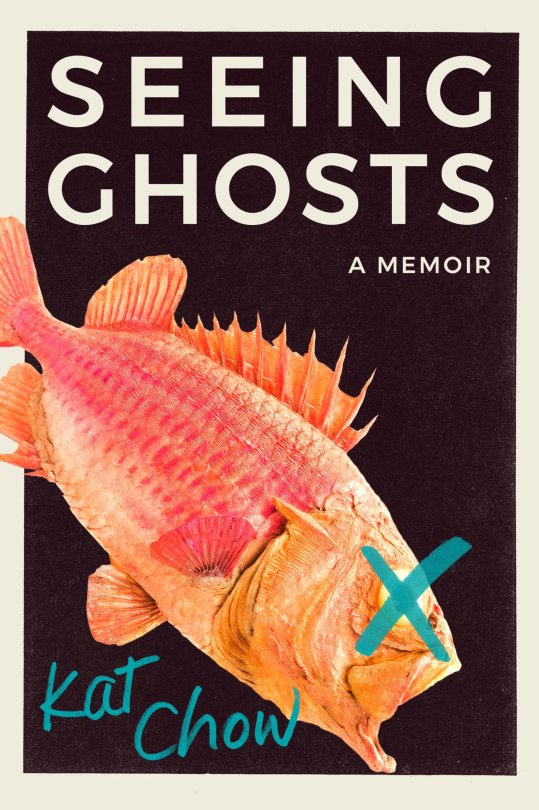

Asian American & Pacific Islander (AAPI) Heritage Month: Nonfiction Recommendations
Speak, Okinawa by Elizabeth Miki Brina
Elizabeth's mother was working on U.S.-occupied Okinawa when she met the American soldier who would become her husband. The language barrier and power imbalance defining their early relationship followed them to the predominantly white, upstate New York suburb where they moved to raise their daughter. There, Elizabeth grew up with the trappings of a typical American childhood, while feeling almost no connection to her mother's distant home and out of place among her peers. This account is a heartfelt exploration of identity and what it means to be an American.
Asian American Histories of the United States by Catherine Ceniza Choy
Original and expansive, this volume is a nearly 200-year history of Asian migration, labor, and community formation in the U.S. Reckoning with the onset of the COVID-19 pandemic and the surge in anti-Asian hate and violence, historian Catherine Ceniza Choy presents an urgent social history of the fastest growing group of Americans. The book features the lived experiences and diverse voices of immigrants, refugees, US-born Asian Americans, multiracial Americans, and workers from industries spanning agriculture to healthcare.
Seeing Ghosts by Kat Chow
Born two years after her parents' only son died just hours after his birth, Kat Chow became unusually fixated with death. She worried constantly about her parents dying - especially her mother. Four years later when her mother dies unexpectedly from cancer, Kat, her two older sisters, and their father are plunged into a debilitating, lonely grief. In this memoir, Kat weaves together what is part ghost story and part excavation of her family's history of loss spanning three generations and their immigration from China and Hong Kong to America and Cuba.
Rise by Jeff Yang, Phil Yu, & Philip Wang
In this intimate, eye-opening, and frequently hilarious guided tour through the pop-cultural touchstones and sociopolitical shifts of the 1990s, 2000s, 2010s, and beyond, authors Yang, Yu, and Wang chronicle how we’ve arrived at today’s unprecedented diversity of Asian American cultural representation through engaging, interactive graphics, charts, graphic essays from major AAPI artists, exclusive roundtables with Asian American cultural icons, and more.
#asian american pacific islander heritage month#AAPI#AAPI authors#nonfiction#nonfiction reads#nonfiction books#Library Books#Book Recommendations#book recs#Reading Recs#reading recommendations#TBR pile#tbr#tbrpile#to read#Want To Read#Booklr#book tumblr#book blog#library blog
46 notes
·
View notes
Text
Cuba reporta 109 nuevos casos de Covid-19
Los casos diarios han experimentado un ligero repunte.
Cuba vuelve a superar la barrera de los 100 contagios de Covid-19 en un día, con 109 reportados este domingo.
Se encuentran ingresados un total de 744 pacientes, sospechosos 298 y confirmados activos 446.
Para la Covid-19 se realizaron un total de 2 mil 572 muestras para la vigilancia, resultando positivas 109. El país acumula 14 millones 034 mil 207 muestras realizadas y 1 millón 108 mil 094…

View On WordPress
0 notes